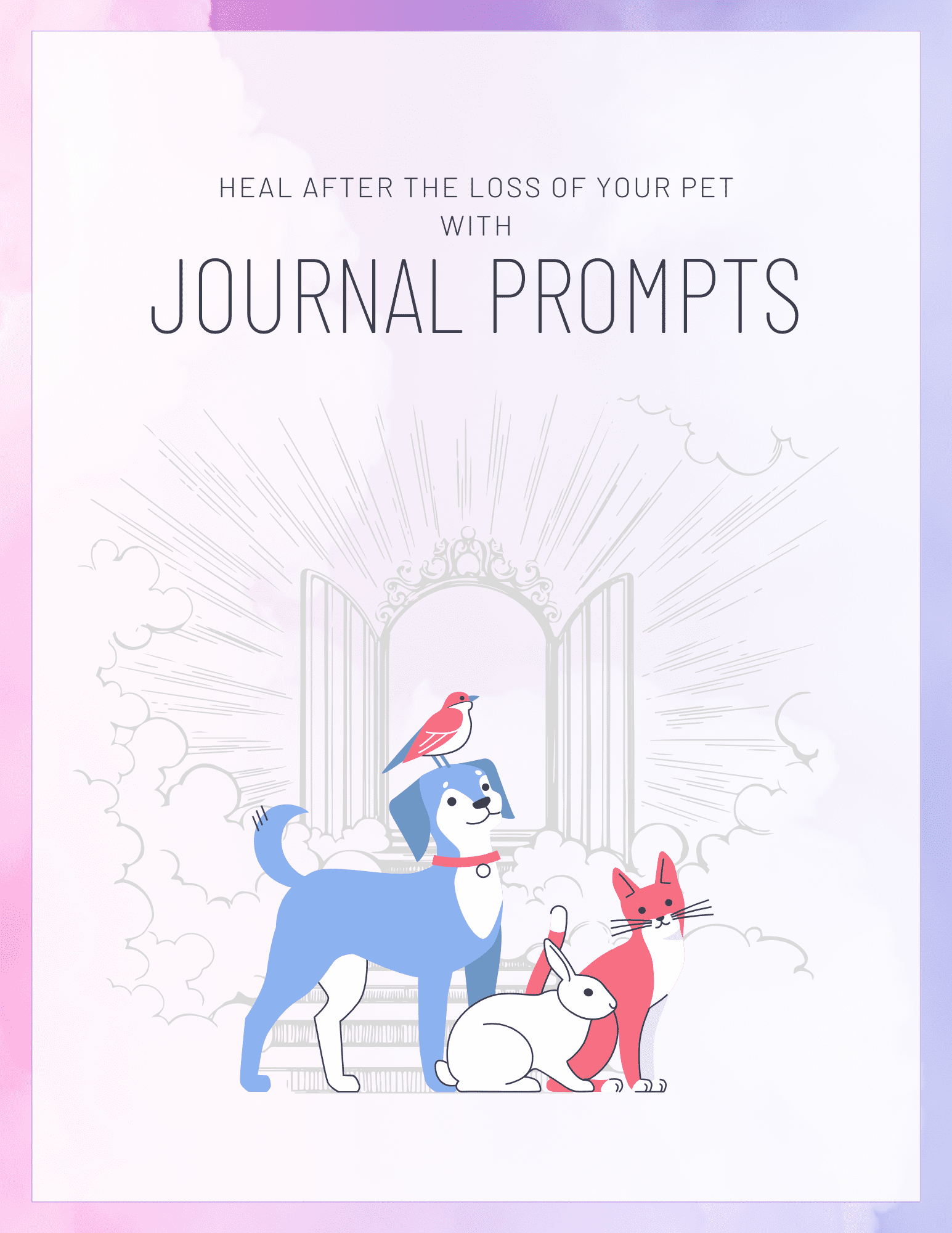Last Updated on November 16, 2023 by Jen
As a pet owner, one of the hardest decisions we have to make is whether or not to let our pet go. Very rarely does a pet pass away on their own. Usually we have to make the decision for them. The decision usually happens when they are very sick and the options to help them lead a healthy and happy life are no longer there.
While everyone’s situation is different, there are some very common feelings that come with the decision to euthanatize your pet. Working through these feelings in your journal can help you heal, as well as give you a place to remember and honor your beloved pet’s life.
30 Journal Prompts That Will Help You Remember Your Pet And Heal After Their Loss
1. Write about the joy your pet brought into your life and the unique bond you shared.
Write about your pet’s silly quirks, their favorite treats, and all the ways they made you laugh. Celebrate the bond you shared – the snuggles on the couch, the long walks in the park, the endless games of fetch. Not only will this help you process your own feelings, but it also honors your pet’s memory.
By holding onto the happy memories, you can find comfort in knowing that although your pet is no longer physically with you, they will always have a special place in your heart.
2. Reflect on how it feels to come home to an empty house. How do you deal with the emptiness?
If you do not have another pet, one of the hardest parts, I’ve found, is coming home to an empty house. The silence and absence of their fur baby energy can be tough to handle. But reflecting on that feeling – really sitting with the emptiness – can be a helpful way to work through the pain of their loss.
When you acknowledge what you’re feeling, you’re able to process it and begin to move forward.
3. Are you considering getting another pet? List the pros and cons.
As your mind lingers on the fond memories with your furry friend, you may wonder whether getting another pet is a good idea. As difficult as it may be, taking time to reflect on this decision is important. This moment of introspection can help you work through the process of grieving and give you time to honor your pet’s memory.
It is not selfish to think about getting another companion; it is a sign that you have learned how to share your love and affection with an animal. Taking time to think about your options is essential to ensuring that you are ready for another pet.
So, pause and reflect, don’t rush into a decision that you may not be mentally, emotionally or financially ready for.
The love and memories you shared with your pet will always be with you, and there will always be another friend ready to receive your love when you are ready.
4. How are other pets in your home reacting to the loss? How can you help them?
If you have other pets, it’s important to remember that your other pets may be grieving as well. They may be confused or anxious about the absence of their friend, and your job as their owner is to help them through this process.
Taking some time to reflect on how your other pets are doing and how you can support them during this time is essential. Whether it’s giving them extra attention, providing them with new toys, or simply giving them space to mourn in their own way, being there for your other pets can make all the difference during this difficult period. So, it’s important to be aware of their feelings and take action accordingly.
5. Write about your feelings of loneliness. How can you comfort yourself in these moments?
After euthanizing a pet, it’s important to take some time to reflect on your feelings, especially those of loneliness. Your pet may have been the constant companion you spent most of your time with, and their absence may leave a noticeable void in your life. However, it’s crucial to remember that it’s okay to feel empty and alone—these feelings are normal and natural.
Allow yourself to grieve and take the time you need to heal, but also consider ways you can comfort yourself during these tough moments. Whether it be self-care or reaching out to loved ones, remember to be gentle with yourself as you navigate through this difficult time.
6. What physical touch or habits do you miss most about your pet? How can you keep their memory alive?
Whether it’s the way your pet used to curl up on their lap, nuzzle against their hand, or follow you around the house – identifying what made your relationship unique can be a way to honor and remember their pet’s life.
Some people choose to create a memorial, like a photo album or special piece of jewelry, while others may volunteer at an animal shelter or make a donation to a pet-related charity in their pet’s name. Whatever the method, keeping their pet’s memory alive can help bring comfort and peace during a difficult time.
7. Describe the silence in the house. Is it calming or daunting?
Beyond the heartbreak of not coming home with your pet, lies a profound silence in the house that can be jarring and difficult to reconcile with life before our pet’s passing.
Reflecting on this empty space can be a powerful exercise in processing our emotions and finding a way forward.
While it may be a painful reminder of all that we’ve lost, it can also serve as a testament to the love and joy that our pets brought into our lives. By allowing ourselves to sit with this silence and truly feel how it affects us, we can begin to move towards healing and acceptance.
8. Write about your pet’s sickness or injury. How did you cope then and how are you coping now?
Writing down your thoughts, feelings, and memories can be a therapeutic way to cope with the emotions you are experiencing. Revisiting how you coped during your pet’s sickness or injury and how you are coping now can also help you understand your emotions better.
It can also offer you a sense of closure and help you move forward. By putting your feelings into words, you will give yourself the space and permission to grieve your loss and find peace.
9. Reflect on how others may not understand your grief. How can you communicate your feelings to them?
Remember that not everyone has had the same bond or love for animals as you did with your pet. Similarly, everyone grieves differently, so discussing your emotions with others can give them a better understanding of your grief and what you need during this time.
Whether it be a friend or family member, openly communicating about your feelings can help create a support system and make the grieving process feel less isolating.
10. How would you explain the loss of a pet to a child?
This exercise can help you cope with the loss by giving you a chance to process your emotions and gain a deeper understanding of the impact your pet had on your life. Additionally, thinking through how you would communicate the loss to a child can help you develop a compassionate and empathetic perspective, which can be quite comforting during a time of grief.
By taking the time to reflect on this difficult topic, you may find that you are better equipped to face your feelings head-on and find healing in the aftermath of a pet’s passing.
11. What daily activities do you miss doing with your pet? How can you commemorate these moments?
Remembering the walks, cuddles, and playful moments you shared can be a cathartic way to cope with the loss. It’s also helpful to consider how you can commemorate those moments.
Perhaps going for a walk at the same time you used to walk them, creating a memory book filled with photos, or planting a tree in their honor, can help bring some closure to the grieving process. By taking the time to reflect and create meaningful tributes, you can keep your pet’s memory alive in your heart while also finding a sense of peace and healing.
12. Write about the love and energy you still have for your pet. How can you channel this energy positively?
Even though they’re gone, your love for them will never fade. Instead, you can channel this energy positively into your life. Perhaps you can volunteer at a local animal shelter or make a donation in memory of your furry friend.
Helping other animals in need can bring a sense of purpose and comfort during this difficult time. By focusing on the positive ways you can honor your pet’s memory, you’ll be able to slowly start healing. Remember, your pet’s love will always be with you.
13. How will special events or holidays feel without your pet? How can you honor their memory during these times?
As we approach special events and holidays, it’s natural to feel their absence even more. Reflecting on how our pets would have fit into these moments can be both comforting and heart-wrenching. But remembering our beloved pets and honoring their memory can also be a way to help us heal.
Maybe we light a candle for them during a holiday dinner, or we can do their favorite activity. Whatever we do, it’s important to acknowledge their absence while still keeping their spirit alive with us.
It’s not about forgetting, it’s about finding a new way to love and remember them.
14. Describe your changed routine without your pet. How can you adapt to this new routine?
After euthanizing a pet, it’s critical to reflect on the changes in your daily routine without them. It may seem challenging to adjust to a new routine without your four-legged companion, but with time, it’s possible.
One essential thing to remember is to take things slow and be patient with yourself. Starting with small positive changes in your daily routine, like going for a walk or reading a book, can gradually make a difference in healing after your loss.
Remembering all the happy times with your pet and creating new memories is also an excellent way to move forward. You have to focus on adapting to your new routine and keeping an open mind. With time, you’ll find a way to cope with your loss while still cherishing the memories you shared with your furry friend.
15. Write about the sense of loss without your pet’s presence. How can you fill this void?
Let it all out. Write about what life feels like without your pet and then find ways to fill the voids that you are feeling.
16. Reflect on the trauma of your pet’s illness or accident. How can you heal from this trauma?
Take some time to think about the illness or accident that your pet went through. Remember the strength and courage they showed during their time of discomfort. How can you adopt some of their strength and use it to heal yourself?
17. What do you miss about your pet’s noise? How can you cherish these auditory memories?
Taking the time to reflect on what you miss most about your pet’s noise can be a cathartic way to begin the healing process. Maybe it’s the sound of their paws padding across the hardwood floor, or the jingling of their collar as they eagerly greeted you at the door. Whatever it may be, these auditory memories are worth cherishing.
Listening to recordings of your pet’s noises or recreating them in some way can help you feel closer to them and keep their memory alive.
It’s important to remember that healing takes time, and there’s no right or wrong way to go about it. By taking the time to reflect on and cherish the sounds that you miss, you can begin to move forward in your grief and honor the memories of your furry friend.
18. If you felt relief after your pet’s passing due to their illness, write about these conflicting feelings.
It’s normal to feel sadness, emptiness, and even guilt – especially if you had to make the tough decision to say goodbye due to an illness. But what about those moments when you feel a sense of relief for your pet’s passing?
It may seem counterintuitive, but it’s perfectly okay to experience both sadness and relief at the same time.
Reflecting on these conflicting feelings can actually help you heal. By acknowledging your emotions and understanding why you feel the way you do, you can start to come to terms with your pet’s passing and move forward with the loving memories you always hold onto. Remember, it’s important to be kind to yourself during this difficult time.
19. Do you feel like getting a new pet is a betrayal? Why or why not?
Reflecting on the idea of getting a new pet, and whether this would feel like a betrayal to your previous pet, is an essential step in the healing process. This thought, although distressing, often emerges following the loss of a pet.
It’s critical to understand that these feelings are normal and quite common. Getting a new pet doesn’t mean you’re replacing or forgetting the one you’ve lost; instead, it can signify your capacity to share your love and home with another animal in need.
Exploring these emotions can help you come to terms with your loss, mitigate feelings of guilt, and potentially open your heart to the prospect of creating new bonds when you are ready.
Remember, each pet brings a unique, irreplaceable presence to your life, and acknowledging this can help you navigate through your grief.
20. Reflect on the financial implications of pet loss.
The financial implications of pet loss are another dimension that warrants reflection. While it may feel uncomfortable to consider, acknowledging these aspects of pet ownership can be part of the healing process. Caring for a pet often involves considerable financial commitment — from regular veterinary check-ups and vaccinations to dietary needs, grooming, and potential emergency healthcare costs.
Losing a pet can result in a sudden change in your financial situation. You may find yourself with extra funds that were previously set aside for pet care. While this can feel strange and even provoke guilt, it’s important to remember that this doesn’t diminish the love and care you provided your pet.
Reflecting on these financial implications can help you to reconcile with your feelings and perhaps even offer opportunities for closure.
For instance, you might choose to donate a portion of these funds to an animal charity in memory of your pet, turning a challenging situation into a positive action.
By addressing these financial changes and understanding their emotional impacts, you can navigate your path towards healing more effectively.
21. Write about any regret you have over missed signs of illness. How can you forgive yourself?
Reflection on regret is a common part of the pet loss journey. You might find yourself questioning if you could have noticed signs of illness sooner, or wondering if earlier intervention could have changed the outcome. Such thoughts, while natural, can add to your grief and create feelings of guilt.
Understand that it’s extremely challenging, and often impossible, to predict the course of an illness. Pets, in their stoic nature, often mask symptoms until they are in the advanced stages of a disease.
Forgiving yourself for what you didn’t know then is a crucial step towards healing. Everyone does their best with the knowledge and resources they have at any given moment.
Remember, you cared for your pet and made decisions with their best interests at heart. Practice self-compassion and remind yourself that you did everything you could with the information you had at the time.
22. Are there any unresolved issues related to your pet? How can you resolve these feelings?
Unresolved issues related to your pet can significantly impact your emotional well-being. Perhaps there are lingering concerns about decisions made during their treatment or guilt about not having spent enough time with them. These unresolved feelings can lead to persistent sadness, anxiety, and a sense of unease.
Reflecting on how you can resolve these feelings can provide much-needed perspective and healing during this challenging time.
23. Write about feeling incomplete without your pet. How can you redefine wholeness?
Losing a beloved pet can leave us feeling incomplete and lost. It can feel as if a piece of us goes missing.
For many of us, our pets are not just companions, but an integral part of our daily lives. Their presence fills our homes with joy and love, and when they’re gone, it can leave a void that is difficult to fill. It’s natural to feel like a piece of ourselves is missing without our pet by our side.
However, it’s important to remember that we are still whole and complete individuals, even without our pets. While they may have played a significant role in our lives, they do not define us as individuals. It can be helpful to focus on the positive memories and lessons we learned from our pets instead of dwelling on their absence.
24. If you’re struggling with feelings of failure or negligence, write a letter to yourself with understanding and forgiveness.
Writing a letter to oneself can be a powerful tool for emotional healing, particularly when grappling with feelings of failure or negligence. This process allows you to verbalize your emotions, creating a safe space for self-reflection and understanding. It’s an opportunity to recount events, examine your actions, and acknowledge any mistakes made. Yet, it’s crucial to approach it with a sense of forgiveness. This act of self-forgiveness can help you let go of the past, reduce feelings of guilt, and foster personal growth.
Importantly, it can initiate the process of healing by reinforcing that it’s okay to make mistakes and that they do not define your worth or your future.
25. Write about any anxieties you have about your other pets’ health. How can you manage these worries?
As pet owners, it’s natural to have anxieties about the health and wellbeing of our furry friends. This can be especially heightened after experiencing the loss of a beloved pet. We may find ourselves constantly checking on our remaining pets, worrying about any changes in their behavior or appearance.
One way to manage these worries is by staying informed and educated about common health issues that may affect our pets. This can involve regularly scheduling check-ups with a trusted veterinarian and asking questions about any concerns we may have.
Additionally, practicing self-care and finding healthy ways to cope with anxiety can also help. This could include activities like exercise, meditation, or talking to a therapist or support group.
Most importantly, it’s essential to remember that worrying excessively does not change the outcome or prevent any potential health issues. Instead, focusing on providing a loving and nurturing environment for our pets can help alleviate some of these fears and strengthen the bond we share with them.
So, it’s crucial to find a balance between being cautious and taking necessary precautions while also trusting in the resilience of our pets. With love, proper care, and regular check-ups, we can help ensure the health and happiness of our furry companions.
Ultimately, it’s important to remember that while we may not have control over everything, we can still make a positive impact on our pets’ lives by being attentive and providing them with love and care.
26. How do you react when people expect you to move on quickly from your pet’s loss? Write a response to them.
Reflecting on our reactions when people expect us to move on too quickly from a pet’s loss is essential for several reasons.
Firstly, it helps us understand our personal grieving process, which is unique and shouldn’t be hurried or judged by others’ timelines or expectations. This reflection can lead to a greater understanding of our emotions and needs during this difficult time.
Secondly, it provides an opportunity to communicate to others about our unique grief journey, helping them understand that we require patience, understanding, and support while we heal.
Lastly, this reflection can also guide us in seeking professional help if our grief becomes overwhelming or if we feel stuck in our healing process. It’s crucial to remember that there’s no set timeline for grief, and it’s okay to take the time we need to mourn the loss of our beloved pets.
27. Write about the impact of your pet’s loss on your mental health. How can you take care of your mental well-being during this time?
The loss of a pet can significantly impact your mental health, leading to feelings of sadness, loneliness, and even depression.
It is crucial to reflect on these emotions rather than suppress them, as this forms an integral part of the healing process.
Reflection enables one to understand the depth of their grief, validate their feelings, and gradually learn to cope.
To take care of your mental well-being during this time, engaging in self-care activities such as journaling your feelings, practicing mindfulness, or doing light physical exercise can be beneficial.
It’s also important to stay connected with loved ones, as their support can provide a sense of comfort and understanding.
If grief begins to feel overwhelming, or if daily functioning becomes challenging, seeking professional help from a mental health counselor could be an important step.
28. Reflect on your decision to put your pet down. How do you feel about it now?
Reflecting on your decision to put your pet down is a vital aspect of the grieving process. It allows you to confront and process your emotions, paving the way for acceptance and healing.
It’s normal to experience a range of emotions, from relief that your pet is no longer suffering to guilt or doubt about your decision. These feelings are part of the complex tapestry of grief, and acknowledging them can foster self-compassion and understanding.
Looking back on the decision with the perspective of time can also help you see that you made the best choice you could for your pet’s welfare, given the circumstances. This can ultimately contribute to finding peace with your decision, and with the loss of your beloved pet.
29. Write a letter to your pet expressing all your unspoken thoughts and feelings. What would you want them to know?
Writing a letter to your pet in your journal, expressing your unspoken thoughts and feelings, can serve as a powerful tool for healing. It can aid in the processing of complex emotions, providing a safe space for you to express your love, guilt, sorrow or even anger.
In writing, you can articulate what you would want your pet to know, thus giving a voice to your innermost sentiments. It allows you to say the things you might not have been able to while they were still with you.
This practice can lead to profound realizations and acceptance, bridging the gap between heartache and healing. Ultimately, writing to your pet can facilitate a journey through grief towards finding peace with your loss.
30. What would your pet want you to know?
Lastly, put yourself in your pet’s shoes. What would they want you to know? Would they want you to remember them fondly and that their unconditional love for you will never end? Or would they rather you move on in life and find joy again?
Whatever it may be, connecting with your pet’s spirit can provide much comfort during this difficult time. Journaling helps keep a part of them alive, while also providing an outlet for the heavy emotions that come with grieving.
No matter what you write, just remember to be gentle with yourself during this process. It’s okay to take as much time as you need. You can honor your pet by simply writing down their memory and keeping it alive in your own special way.
Note: You can connect with your deceased pet in lucid dreams. It might be a great way for your to hold them again or get messages from them that give you the healing you need.





